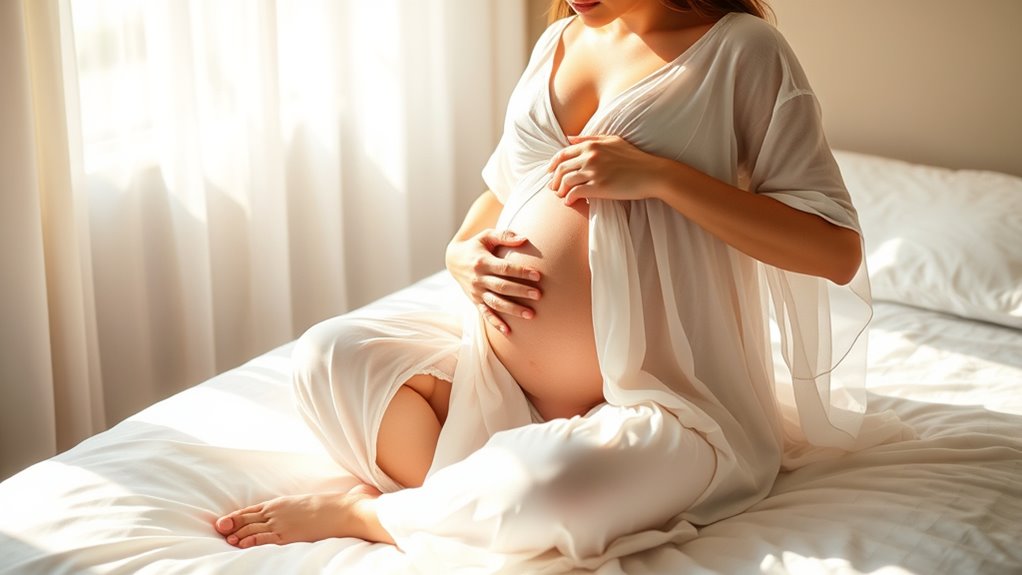Your postpartum body goes through many changes that often go unspoken, but embracing these shifts is key to healing and self-love. You may notice your body looks different, with lingering swelling, tender breasts, or new curves, all signs of recovery. Hormonal shifts can bring mood swings, fatigue, or hair shedding, which are normal. Patience and kindness toward yourself help this progression. Stay open—there’s a lot more to discover about your resilient postpartum journey.
Key Takeaways
- Recognize that physical changes like lingering swelling and softening are natural signs of healing and should be met with patience.
- Understand hormonal shifts can cause emotional ups and downs, emphasizing the importance of self-compassion and support.
- Celebrate your body’s resilience, acknowledging each physical and emotional milestone as part of the recovery journey.
- Embrace your body’s transformation as a testament to endurance, fostering confidence and acceptance during postpartum adjustments.
- Prioritize self-care and gentle routines to facilitate healing and nurture both physical and emotional well-being.

Have you ever wondered what to expect from your body after childbirth? It’s a natural question, especially since the postpartum period can bring a whirlwind of physical and emotional changes. One of the first things you might notice is how your body image shifts. You may feel surprised or even uncomfortable seeing your reflection, as your body looks different than it did before pregnancy. That’s completely normal. Your body has been through a profound transformation, and adjusting to these changes takes time. Some parts may feel softer, your belly might still be swollen, and your breasts could be larger or tender. These are all part of the healing process and your body’s way of nurturing your baby. Remember, your body has accomplished something incredible, and it deserves patience and kindness as you navigate these changes.
Hormonal shifts play a big role in how you’re feeling physically and emotionally after birth. During pregnancy, your hormones surged to support your baby’s development, but after delivery, they rapidly decline. This sudden drop can cause a range of effects, from mood swings and fatigue to changes in your skin and hair. Some women notice their hair thinning or shedding more than usual, which is temporary but can be unsettling. The hormonal fluctuations also influence your emotions, sometimes making you feel overwhelmed or teary, even if you’re happy about your new arrival. It’s important to recognize that these shifts are normal and part of your body’s way of resetting after pregnancy. Giving yourself grace during this time is essential. Your body is working hard to recover and adapt, and those hormonal shifts are an integral part of that process. Additionally, understanding the natural postpartum healing process can help you be more patient with your body’s timeline.
You might also experience physical sensations like cramps, vaginal bleeding, or soreness as your body heals. These signs indicate that your reproductive system is returning to its pre-pregnancy state. It’s easy to feel impatient or frustrated with these lingering symptoms, but try to remember they are temporary. Your body is gradually regaining its strength, and each day brings progress. Embracing your body’s natural changes means understanding that these adjustments are a testament to what your body has endured and accomplished. It’s okay to take your time, to focus on self-care, and to seek support when needed. Your postpartum body is a unique and resilient vessel, and honoring its journey will help you find confidence and peace amidst the inevitable transformations.

Frida Mom Belly Binder, Postpartum Essentials for Natural and C-Section Recovery, Adjustable Compression Wrap, After Birth Brace, Abdominal Band, 9" High
POSTPARTUM RECOVERY SUPPORT: Our postpartum belly wrap features 3-point adjustable compression technology to prevent that "falling out" sensation;…
As an affiliate, we earn on qualifying purchases.
As an affiliate, we earn on qualifying purchases.
Frequently Asked Questions
How Long Does Postpartum Hair Loss Typically Last?
Postpartum hair loss usually lasts between three to six months, caused by hormonal shifts after childbirth. You might notice shedding more than usual, but it’s temporary. To support hair regrowth, focus on a balanced diet, gentle hair care, and stress management. Remember, hair loss causes like hormonal fluctuations will stabilize over time, and with patience and proper hair regrowth tips, your hair will regain its thickness and strength.
Are Stretch Marks Permanent or Can They Fade?
They say “time heals all wounds,” and that’s true for stretch marks too. While they aren’t usually permanent, their fading timeline varies from person to person. You can explore stretch mark remedies like moisturizers, retinoids, or laser treatments to help them fade faster. Keep in mind, patience is key, and over time, your stretch marks may become less noticeable, blending more with your skin’s natural tone.
What Are Safe Ways to Regain Pelvic Floor Strength?
To regain pelvic floor strength safely, focus on pelvic floor exercises like Kegel techniques. These exercises strengthen the muscles supporting your bladder, uterus, and bowel. Start with gentle contractions, hold for a few seconds, then release. Do these exercises regularly, ideally three times daily. Avoid heavy lifting or high-impact activities until your strength improves. Consistency is key to restoring pelvic health and preventing issues like incontinence.
How Can I Improve Breast Shape After Breastfeeding?
Breast shape changes after breastfeeding often feel like a loss, yet they reflect the incredible benefits of breastfeeding. To improve your breast contouring, consider gentle exercises like chest presses and posture improvements. Moisturizing and supportive bras help maintain firmness. Remember, your body’s transformation is a proof to your strength and nurturing. Embrace these changes, knowing that subtle enhancements and self-care can restore confidence while honoring the beautiful journey of motherhood.
Is It Normal to Feel Emotional Swings Postpartum?
It’s completely normal to feel emotional swings postpartum. Hormonal fluctuations during this time can cause mood changes, making you feel happier one moment and overwhelmed the next. These shifts are natural as your body adjusts. To build emotional resilience, prioritize self-care, seek support, and allow yourself to experience your emotions. Remember, your feelings are valid, and with time, these emotional swings typically stabilize as your hormones balance out.

CaboCréme Extra Strength Cabbage Breast Cream – 2X Strength for Engorgement Relief and Breastfeeding Weaning Support – Dry Up Breast Milk – OB-GYN Created & Breastfeeding Mother-Approved – 2 oz
RELIEVE BREAST DISCOMFORT: CaboCréme Extra Strength is formulated with concentrated cabbage leaf extract to adress intense breast engorgement…
As an affiliate, we earn on qualifying purchases.
As an affiliate, we earn on qualifying purchases.
Conclusion
Remember, your postpartum body is a hero’s armor, bearing stories of new life and resilience. Embrace every stretch mark and change as part of your unique journey—like a vintage quilt stitched with memories. Don’t compare yourself to anyone else’s timeline; instead, celebrate your own renaissance. This isn’t a fleeting chapter, but a timeless tale of strength and growth. So wear your new you proudly, for in this story, you’re the star, and your body’s masterpiece.

Ayurvedic Hormone Balance for Women | Mood, Energy, & Sleep Support | Cortisol Manager | Regulates Estrogen | Stress Relief | Ashwagandha, Rhodiola, & Shatavari | Made in USA | 60 Ct. – OSH Wellness
HORMONES AND MOOD: Hormones play a vital role in regulating our mood, sleep, and overall health. When hormone…
As an affiliate, we earn on qualifying purchases.
As an affiliate, we earn on qualifying purchases.

New Mom Care Package After Baby, 7pcs New Mom Gifts Set After Birth, Postpartum Gifts for Mom, After Birth Postpartum Essentials for Mom Kit, Pregnancy Gifts for First-Time Moms, Expecting Mom
【New Mom Gifts After Birth】 Looking for the perfect gift for a first-time mom or postpartum mom? This…
As an affiliate, we earn on qualifying purchases.
As an affiliate, we earn on qualifying purchases.









